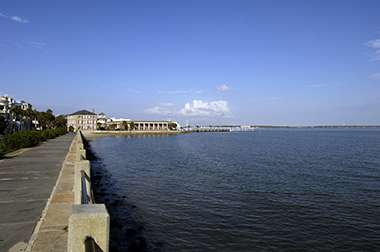Shifting winds in the climate change debate

(Phys.org) —A favorite beach. Homes along the river or coast. Crop yields that sustain the populace.
These are just some of the things that climate changes are threatening, and scientists are beginning to focus on three essential questions about how to prepare for our planet's future.
The first: How long will we be able to successfully adapt to new climatic conditions? With some beaches, for example, bringing in more sand and building jetties will be pointless if the sea level rises beyond a certain point.
The second: What will happen when the risks that climate changes pose become intolerable? The owner of a riverfront house that must be reclassified as being in a flood zone might want to sell – but who would she sell to, and what effect would the reclassification have on the price it might fetch?
The third: When will the risks to crops under changing conditions become so great that farmers without insurance will want to find new livelihoods, or simply accept the real possibility that their yields might not be enough?
Those are some of the questions that University of South Carolina geography professor Kirstin Dow wants the greater public to begin to talk about.
Policy-makers have recognized that the notion the world will reduce greenhouse gas emissions anytime soon is unlikely, according to Dow. "We're clearly moving toward an approach of adapting to new conditions and managing risks," she said.
"Is it possible to protect everything we value through adaptation? The answer likely appears to be no," Dow said. "We expect that, in some situations, risks will push people to give up many things that they value very highly. Or many things we value highly will be placed at unacceptable risks."
In a commentary in Nature Climate Change, she and an international team of colleagues argue that "we need to both develop a clearer understanding of the limits of adaptation and anticipate the debates we'll encounter when people are confronted with major changes to their lifestyles."
"We've only recently begun a conversation to seriously look at adaptation within climate change," Dow said. "For a long time it wasn't discussed, because of the fear that if you gave people an out, they wouldn't focus on mitigation – reducing greenhouse gas emissions."
"But as the degree of change and the rate of greenhouse gas emissions continue to grow, the significance of the need to adapt – and for some people, the imperative to adapt – has become more immediate. And so that conversation has opened up."
Dow and colleagues are demonstrating the connections between the emerging discussions of adaptation and adaptation limits by using the well-established discipline of risk management. They clearly define a critical point in adaptation: the level at which a person or group deems a risk intolerable.
"Beginning from an understanding of how societies respond to risk, researchers need to come to better understand where those adaptation thresholds or limits might be – we're not real sure where they are right now," Dow said. "We think if we could better anticipate them, we could inform better strategies and, drawing on other lessons from risk management debates, prepare for deliberative process in society, civil engagement about choices that have to be made."
The scientists are trying to move the public debate toward addressing climate change as a risk management issue, but with a broad perspective. "We need to fully embrace the concept of risk," Dow said. "There's an actuarial kind of risk that insurance companies use – household damage in dollars from a hundred-year flood, for example – but the whole history of risk management, scientifically and intellectually, recognizes that the public definition of what's an 'acceptable' or 'tolerable' or 'intolerable' risk is much broader than property loss."
Take a beachfront community that's been the family destination for two generations as an example. Originally built well removed from the shore, the owners might sense that risks from incoming storms are acceptable or tolerable. But rising sea levels will eventually erode confidence, and at some point the owners might experience a rude awakening of serious doubt about the value and future of their properties. "If we could better anticipate what is intolerable, could we make the process of change occur more smoothly?" Dow said.
"Adaptation and change engage questions of things that are very difficult to value, like favorite beaches, cultural and environmental loss, questions about fairness, and whether the risk is voluntary or not."
Dow noted that small island states in the Pacific Ocean and parts of the U.S. are already preparing for dramatic changes. "In some places, people are already planning to abandon their island nations. In Louisiana, they're experiencing things like watching the shorelines erode and wash their cemeteries into the ocean."
"These are the kinds of questions that we're going to have to begin to think about."
Journal information: Nature Climate Change
Provided by University of South Carolina

















